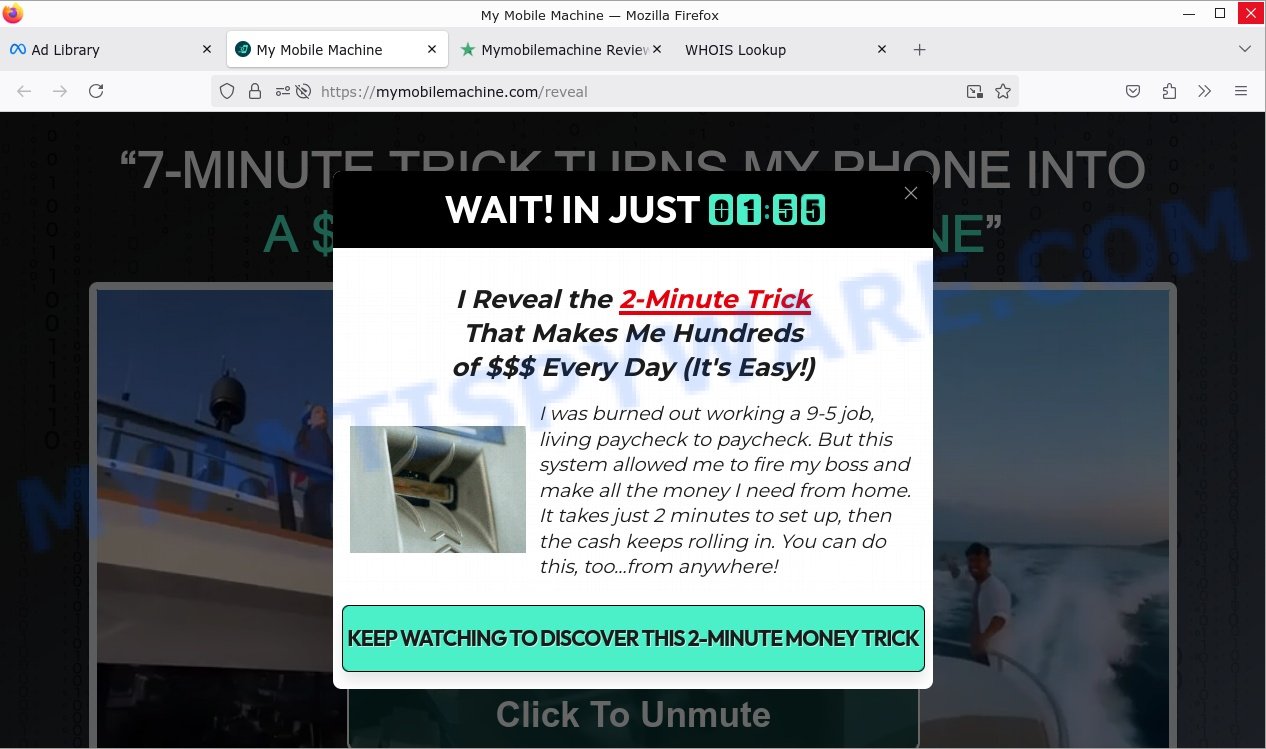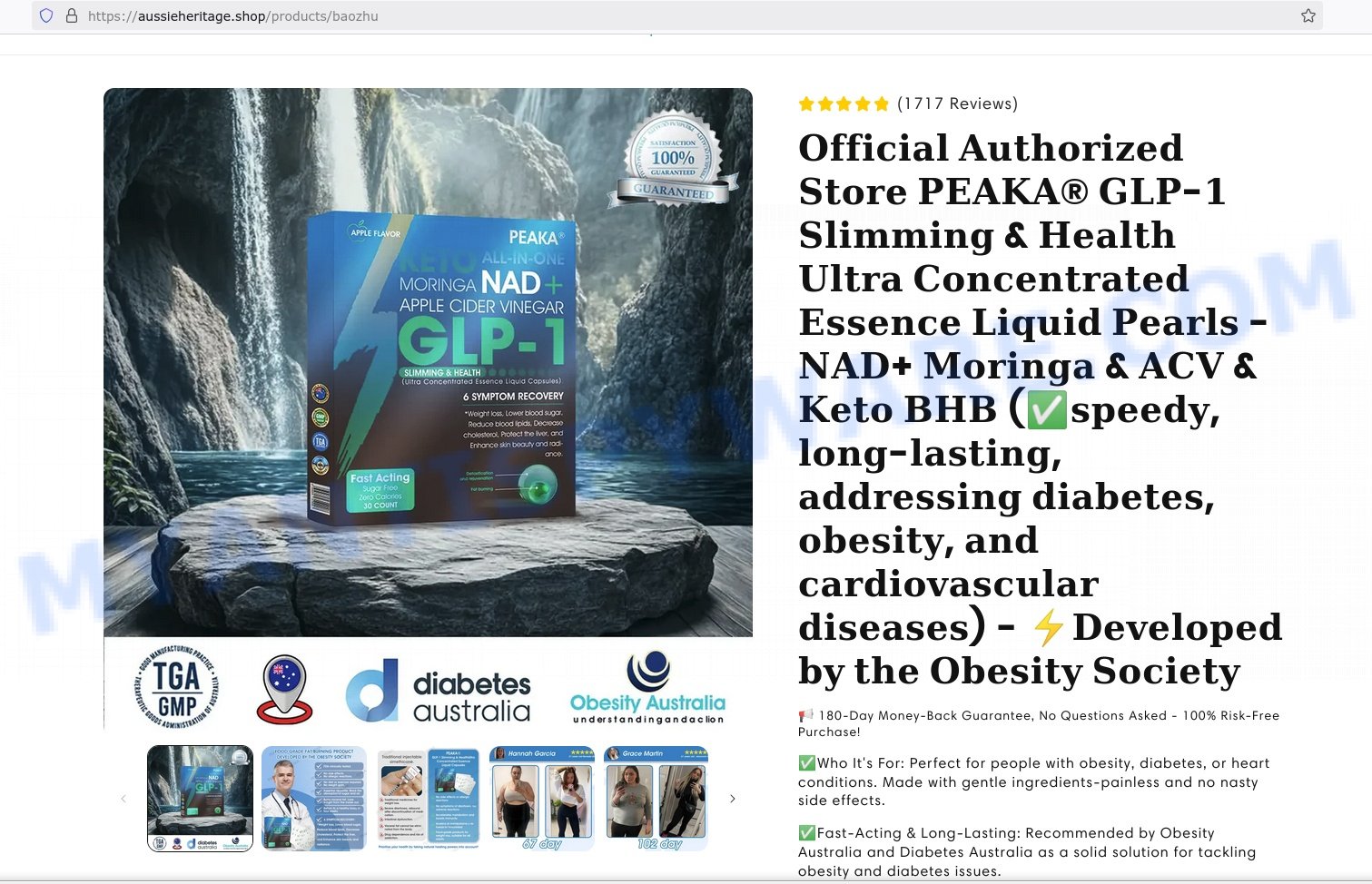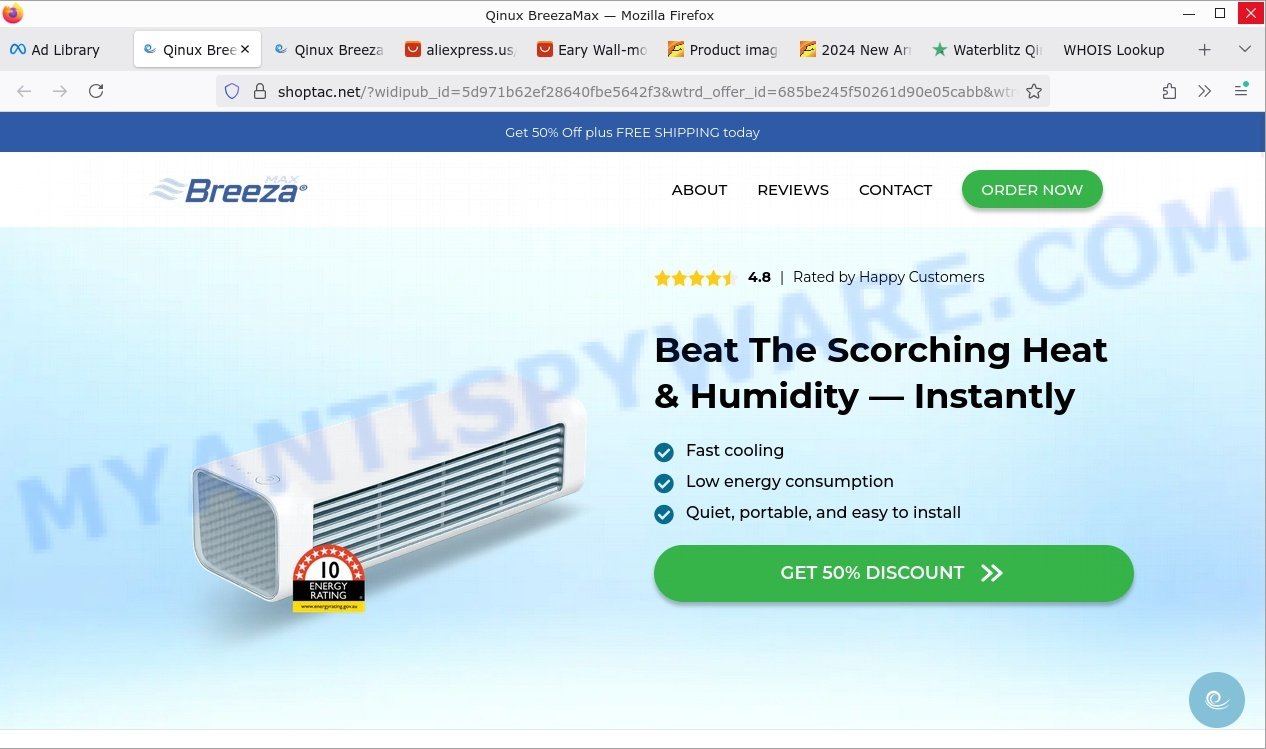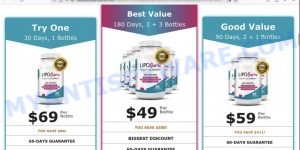Beware of the Pink Salt Trick Scam promoting LipoBurn! This scam is aggressively pushed through enticing Facebook ads featuring dramatic videos and celebrity endorsements—none of which are true. The ads claim that drinking a Japanese pink salt cocktail every night can instantly melt away belly fat, suppress appetite, and lead to astonishing weight loss without dieting or exercise. Phrases like “Kelly Clarkson lost 31 pounds in 10 days” and “Better than Ozempic and Mounjaro combined” are used to lure in desperate people searching for easy solutions.
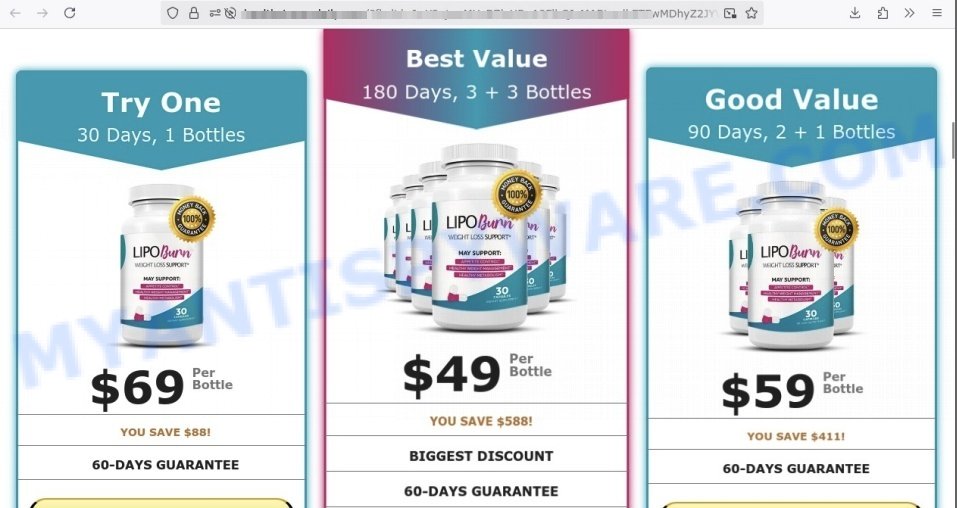
The video itself is a masterclass in deception. It starts fast to hook viewers but then drags on with vague storytelling about secret scientific discoveries and hidden weight-loss hormones, never actually revealing the “secret recipe” promised. It references fake celebrity stories and fabricated doctor endorsements to build false credibility. Towards the end, it finally tries to sell LipoBurn, a dietary supplement with empty promises and heavy use of pressure tactics, such as limited stock warnings and large discounts that seem “too good to miss”.
The product website floods you with fake customer testimonials—thousands of glowing reviews supposedly from regular people losing massive amounts of weight effortlessly. However, independent sources like Trustpilot and Amazon show no genuine reviews, exposing the scam’s dishonesty. Important product details are buried, and disclaimers admit the claims lack scientific support.
If you’re tempted by LipoBurn or the Pink Salt Trick, don’t fall for it. These scams prey on people’s hopes with misleading ads and fake endorsements. Real weight loss requires proven methods under medical guidance, not secret ingredients or miracle drinks. Always research thoroughly and consult healthcare professionals before trying any supplement pushed through questionable marketing. Stay safe and avoid wasting money on these risky schemes.
💡 Heads-up: Similar Scams Are Everywhere. LipoBurn is not unique. It is one of many fake supplements, gadgets, and other schemes we expose in our Fact Checks section. All of them aim to grab your personal data or money. The people behind these scams run slick websites, spread bogus promo codes, and even pose as trusted brands or experts. Below are a few recent scams that follow the same playbook as LipoBurn: 7 Minute WiFi Blueprint, Vittaburn Drops, Lmipki Nano Microneedle Patch, Automatic Cash Machine, AquaSculpt.
Table of Contents
🚨 Is the LipoBurn Pink Salt Trick a Scam?
The LipoBurn Pink Salt Trick is aggressively marketed using deceptive and sensational tactics that prey on people desperate for fast and effortless weight loss solutions. The promotional materials claim this “Japanese pink salt cocktail” can melt away fat overnight, outperform popular medications, and activate fat-burning hormones without diet or exercise. However, these promises raise serious red flags commonly associated with scams.
Key Red Flags:
- 🌐 Misleading Facebook Ads: The ads rely solely on a dramatic video with vocal narration, promising drastic weight loss simply by drinking a pink salt cocktail before bed. The video uses celebrity endorsements from questionable sources like “Kelly Clarkson” without any verified proof.
- ⭐ Fake Testimonials Flooding Comments: The “reviews” on the landing site (healthstreamdaily.com) are overwhelmingly positive but cannot be independently verified. Most profiles and comments appear generic or fabricated, with no presence or credibility outside the sales page.
- 🔒 Vague and Hidden Ingredients: Despite a long video promising a “secret recipe”, the actual ingredients are never fully disclosed, leaving consumers unable to verify or assess the product safely.
- ⚠️ Exaggerated and Unrealistic Claims: LipoBurn is advertised as “better than Ozempic and Mounjaro combined”, promising rapid weight loss of over 15 pounds in a week, zero side effects, and effortless fat burning. These claims are not supported by any credible scientific studies or clinical evidence.
- 📉 Low-Quality Website and High-Pressure Sales: The site uses countdown timers, limited stock alerts, and multiple discounted packages to create urgency and push impulsive purchases. The quality and design resemble common scam pages.
- 👤 Hidden Identity and No Transparent Contact Info: There is no clear information about the manufacturer, scientific backing, or regulatory approvals. Despite claims of FDA registration and GMP manufacturing, no verifiable evidence supports these assertions.
- 🔗 60-Day Money-Back Guarantee of Questionable Value: Although there is a 60-day refund guarantee, these policies are often difficult to enforce or honor in scam setups.
In summary, the LipoBurn Pink Salt Trick employs classic scam strategies: fake celebrity endorsements, unverifiable testimonials, exaggerated health claims, vague ingredient lists, and high-pressure sales tactics. These factors strongly suggest that the product is unlikely to deliver the promised benefits and may be a fraudulent weight loss scheme. Consumers are urged to avoid purchasing LipoBurn and instead consult qualified healthcare providers for safe, evidence-based weight management options.
🕵️♂️ How the LipoBurn PINK SALT TRICK Scam Operates
Scammers behind the LipoBurn Pink Salt Trick start by flooding social media platforms like Facebook and TikTok with catchy video ads. These videos push a simple yet sensational claim: just drink a mysterious “Japanese pink salt cocktail” before bed, skip dinner, and watch fat melt away almost overnight. The ads feature dramatic personal stories and celebrity endorsements, like Kelly Clarkson supposedly losing massive weight with zero effort.
When users click on these ads, they are taken to a slick but suspicious-looking website (often healthstreamdaily.com) that mimics trustworthy health and wellness sites. The content mostly consists of long, emotionally charged videos loaded with click sounds, sliding tones, and dramatic storytelling. The videos promise a secret, natural fat-burning “pink salt trick” that supposedly activates key fat-burning hormones better than popular drugs like Ozempic and Mounjaro — without needles or side effects.
However, the videos never reveal the full recipe or detailed scientific proof. Instead, they keep viewers hooked with slow progress bars and tantalizing hints. The ultimate goal is to funnel visitors to buy LipoBurn supplements, which are presented as the magic solution to weight loss problems.
These product pages are filled with common scam tactics:
– Fake urgency with countdown clocks and limited stock notifications pushing you to “buy now”.
– Over-the-top discounts and bundled packages to trick you into larger orders.
– Claims of “FDA registered”, “GMP certified”, and “100% natural” production—though dietary supplements like LipoBurn are not FDA-approved drugs.
– A 60-day money-back guarantee that sounds reassuring, but the refund process is often convoluted or non-responsive.
– Highly positive testimonials displayed on the sales page with hundreds or thousands of glowing comments from supposed users.
– But independent review sites like Trustpilot or Amazon show no genuine customer feedback, or none at all, which is a major red flag signaling fabricated reviews.
After purchase, customers often report aggressive upsells, unclear billing practices, and difficulty contacting customer service—many complain of unexpected recurring charges or poor support.
In summary, the LipoBurn Pink Salt Trick scam relies heavily on viral-style video ads, fake celebrity endorsements, misleading scientific jargon, deceptive website design, and fabricated reviews. It preys on people desperate for easy weight loss solutions by promising fast, effortless results with a “secret” pink salt recipe that never delivers. Ultimately, buyers are left out of pocket, frustrated, and looking for answers from a product with no credible proof or health authorities backing it.
😱 What to Do If Scammed
If you find yourself ensnared by the LipoBurn Scam, immediate action is crucial. Here’s what you should consider doing:
🛑 Stop Further Transactions
The first step is to halt any additional transactions that might be in process. Contact your bank or credit card provider and inform them that you’ve fallen victim to a scam. They can help by blocking the card or reversing any unauthorized transactions.
📞 Report the Fraud
File a report with your local police and provide all the available evidence, such as screenshots, emails, and website URLs. Additionally, report the scam to online portals like the Better Business Bureau (BBB) at www.bbb.org or the Federal Trade Commission (FTC) at reportfraud.ftc.gov. If you’re in another country, reach out to your national consumer protection agency.
💻 Take Screenshots
Before the scam website gets taken down or changes, make sure to capture screenshots of your transactions and communications. These can serve as evidence if you decide to pursue legal action.
⚖️ Consult Legal Advice
Speak to a legal advisor about your situation. While pursuing legal action may be time-consuming and costly, it could be a possible avenue for recovering your lost money.
📢 Share Your Experience
Use social media platforms to share your experience and warn others about the scam. Your story could prevent someone else from falling victim to the same or similar scams.
Summary Table
| Factor | Observations | Impact on Legitimacy |
|---|---|---|
| Product Description | LipoBurn is promoted through a long video claiming a “pink salt trick” that helps people lose weight quickly and easily by activating fat-burning hormones. The marketing falsely associates the product with celebrity endorsements like Kelly Clarkson. It promises dramatic weight loss without diet or exercise, relying on vague, unproven ingredients and concepts. | Negative (Unproven claims and misleading celebrity endorsements) |
| Advertising Method | Facebook ads use emotionally charged videos with dramatic stories about quick weight loss. They show fake testimonials and social media comments to create false social proof. The ads link to a site that keeps users watching a long video before pushing the supplement sale. | Negative (Deceptive and manipulative marketing) |
| Website Content | The website promotes LipoBurn with time-limited discount offers and a scarcity message (“Only 27 bottles left”). It features glowing but unverifiable comments and vague promises of a money-back guarantee. The product claims FDA registration and GMP practices without proof, while hiding the real ingredients and evidence of effectiveness. | Negative (Opaque sales tactics and lack of transparency) |
| Product Ingredients & Claims | The supposed “pink salt trick” recipe is never fully revealed. It claims to activate hormones more effectively than real medications like Ozempic but provides no scientific proof. The actual supplement’s ingredients remain unclear, and there are no clinical studies supporting its use. | Negative (Unverifiable formula and false health claims) |
| User Reviews | Reviews on the promotion site are all positive but appear fabricated. Independent platforms like Trustpilot and Amazon show no genuine feedback or reviews for LipoBurn. This discrepancy indicates the testimonials and social proof are likely fake. | Negative (Fabricated testimonials and no independent verification) |
| Pricing and Sales Pressure | The product is sold with aggressive discount pricing and “limited time” offers to rush purchases. Multiple package deals try to encourage expensive bulk orders. The refund policy promises 60 days money-back but user experience suggests it could be difficult to claim. | Negative (Pressure sales tactics and possibly misleading refund policy) |
| Company Transparency | Contact details and company information are minimal or hidden. The website uses generic privacy protected domain registration and provides no verifiable address or credible customer support contacts. | Negative (Lack of transparency and limited customer support) |
| Overall Legitimacy | The product is part of a common scam pattern using fake celebrity endorsements, exaggerated claims, and emotional marketing to sell a supplement with no clear evidence of safety or effectiveness. It is recommended to avoid purchasing or relying on this product. | Negative (Likely scam with deceptive marketing and unproven claims) |
Conclusion
The LipoBurn Pink Salt Trick is a scam that preys on hopeful consumers with exaggerated claims, fake celebrity endorsements, and deceptive marketing tactics. The entire promotion hinges on a viral pink salt cocktail “secret” that supposedly activates fat-burning hormones and helps users lose extraordinary amounts of weight effortlessly. Yet, the promised “secret recipe” is never fully revealed, serving only as bait to funnel viewers into purchasing overpriced LipoBurn supplement bottles.
This scam uses flashy Facebook ads featuring scripted testimonials and staged videos touting rapid, dramatic weight loss without any credible medical evidence. Fabricated endorsements from celebrities like Kelly Clarkson and Rebel Wilson, along with bogus comments on sales pages, aim to create a false sense of trust. The product’s website even falsely claims GMP and FDA registration to bolster its seemingly legitimate image.
Bottom Line: Avoid LipoBurn and the “Pink Salt Trick” scam. There is no magic salt cocktail that burns fat while you sit on the couch eating burgers. The promotional content manipulates viewers with misleading information and pressures them into buying expensive supplements that lack proven effectiveness. Always be skeptical of weight loss solutions that promise fast results with no effort and rely heavily on fake testimonials and unverifiable claims.

